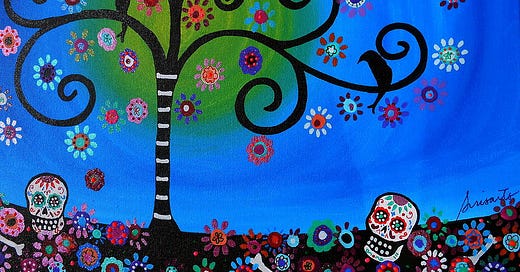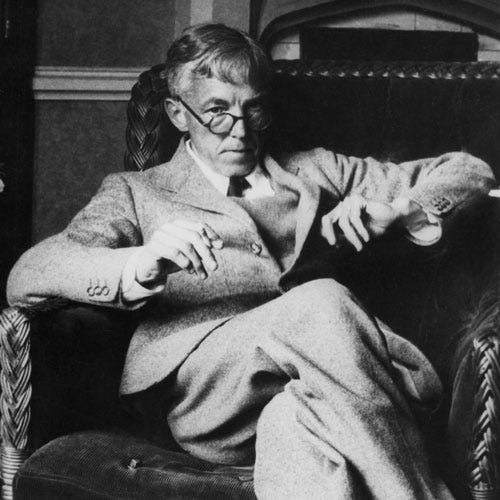Wait! Just Listen is a weekly Sunday newsletter on living a purposeful and meaningful life, in a digitised world of opinion polarisation, gratuitous commentary and click-bait. Subscribe with one-click to receive my musings right in your inbox. If you want access to topics and recordings more attuned to the craft of writing and ideation, do consider opting for the paid version of this newsletter.
Back in my youth as an aspiring scholar, I found myself repealing everything conventional to assign meaning to my inner voice; to breath life in my pursuit of purpose. I’d spend considerable time reading about the greatest minds in history; intellectuals who embark on that exhaustive journey of moving from a suppressed voice of searing potential to an emulated voice of inspiring intellect. I was dizzy with anticipation waiting for time to bequeath me with wisdom and maturity, drawing me closer to that crowning moment of glory - the pinnacle of spiritual, material and intellectual success.
That moment never came.
My arrival to this imagined mecca of greatness remained all but a utopian dream because every goal I set myself lost its inherent appeal the moment I achieved it. I’d be in a perennial search for that next seductively unattainable dream to appropriate as my new purpose. This ceaseless and sometimes painful journey would eventually, through a mix of fortune and grind, lead me to gaining tenure at my current age of 37, an accolade that I originally thought would put a refreshing end to my purpose-seeking quests.
It didn’t. I continued harbouring an endless list of unfulfilled ambitions even if I wasn’t exactly clear what they were, trapped in a cesspool of insecurity and dissatisfaction. You see, the human mind has long been at the end of its wits, attempting to sieve validation in a pragmatic funnel against a narcissistic one, often with little success. My life wasn’t much different.
4 months ago, I chanced upon an essay written in 1940 by English mathematician G.H Hardy titled, “A Mathematician’s Apology”. While it’s central premise revolved around the invaluable patterned significance of math in life, hidden in its narrative core for the meticulous reader, was an examination of human restlessness and the constant need for people to seek purpose and meaning in their lives. The essay was composed at a time when Hardy himself was in the throes of depression, worsened by the threat of looming war and an unnerving belief that not all his struggles and triumphs as a mathematician were noble. In essence, it is a beautiful story of a man trying to hold himself up with dignity and survey a beautiful territory that is now inaccessible to him.
Moving beyond the tragic backdrop, the essay contained ideas that, to me, were usually revealed over late night brandies during international academic conferences, when hardened logic and sobriety give way to more expansive views of reality. There was however one particular passage that resonated with my soul; the sentences, themselves, ran like trimmed creepers, embracing me in a cocoon of adrenaline rush.
A man who sets out to justify his existence and his activities has to distinguish two different questions. The first is whether the work which he does is worth doing; and the second is why he does it, whatever its value may be. The first question is often very difficult, and the answer very discouraging, but most people will find the second easy enough even then. Their answers, if they are honest, will usually take one or other of two forms; and the second form is a merely a humbler variation of the first, which is the only answer we need consider seriously.
Most people, Hardy asserts, answer the first question by pointing to a natural aptitude that guided them to a vocation predicated on that particular aptitude — the doctor became a doctor because he naturally excels at understanding the ailments of the human body, the footballer because he has a natural gift for football.
Hardy notes that whilst we all have our individual talents in varying fields of specialisation, different activities offer different degrees of benefit to society in what is best described as a hierarchy of value. Most people choose their occupation on the basis of their greatest natural aptitude.
Regardless of ones’ vocation, ambition, Hardy argues, is what drives us to value something. But ambitions can possess us, ranging from the vain and greedy to the most elevated and idealistic. In fact, untamed ambition stands in the way of meeting life on its own terms with calm consent. The type of ambition Hardy refers to however is less rooted in self-indulgence and more aligned with a sense of service.
Hardy states that the noblest of all ambitions is “that of leaving behind something of permanent value” for the generations that precede us. From reading Hardy, it became clear to me that destinations are often misnomers for all they do is set us onto a new journey.
The most enduring form of purpose lies in how we harness our own circumstances and resources to create sustainable change no matter how big or small, to advance the universal development of humanity. Because every card life deals us, be it winning or losing, is temporarily borrowed from the deck to which it must ultimately return.
Holding on to an ambition that rests on emboldening human progress may be seen by some as a lofty endeavour fuelled by an untameable messiah complex, but I can assure you it is not. It is an ambition not qualified by scale or grandiosity. Instead, it stems from an earthly and humble desire to enact positive and intrinsic change with posterity in mind. Chasing personal highs often give the illusion of reaching for greatness while constricting us into increasingly suffocating smallness.
Seen in this way, one’s life purpose isn’t a map to a specific outcome but a compass to influence the orientation of an entire world. It is driven by a basic instinct to contribute in a meaningful way. And for that, there needs to be a generosity of spirit and an unappeasable hunger to make other lives more liveable, freeing ourselves from the self-limiting notions of what progress should look like. We must reach across the divides within and without, across the abysses of self-centredness and single mindedness, with a generous and largehearted trust in one another, which is at bottom trust in ourselves. Let our lives be an ode to humanity and the many virtues that guard it from losing its sheen.





Great read - made me think of the Buddhist Eight Fold Path (my husband is Buddhist) - one of which is ‘Right Livelihood’. I derived a great deal of satisfaction from my previous career as a midwife. I am a Druid and the equivalent for us is ‘Service’. Our work/career often has a point of divergence - my husband was an architect and chose to build ‘council’ houses and elderly care homes rather than ‘gin palaces’. I know someone who as a law student had the choice to pursue human rights or corporate law at one point. I believe that for too many it is lifestyle that is chosen over fulfilment - the choice led by economics rather than peace of mind. I feel privileged to have never been driven by anything other than what intuitively felt ‘right livelihood’.
This piece really resonated with me. Someone very close to me recently died very suddenly. He had lofty ambitions, achieving most of them in his short life. His aspirations were mentioned at his funeral, but the stories of small individual offerings of kindness to others were remembered above all else. Never underestimate how meaningful service and genuine interest in the well-being of others is; it changes individuals, and the ripple effects last longer than we can imagine.